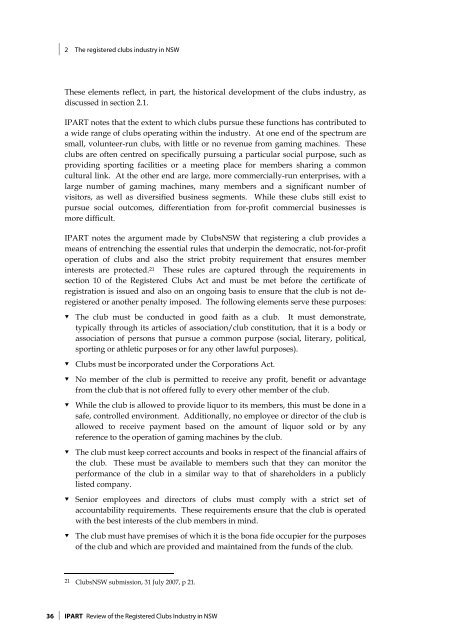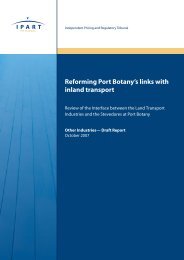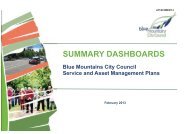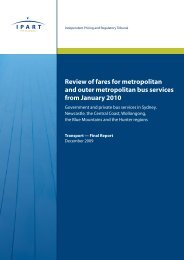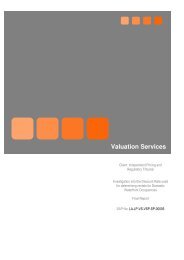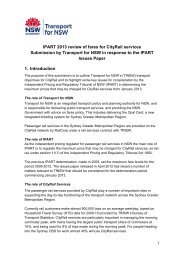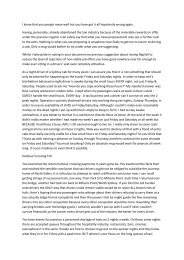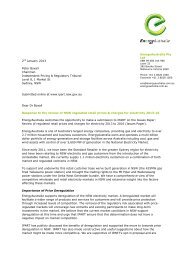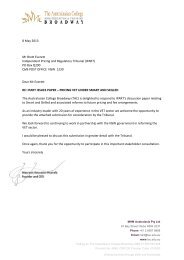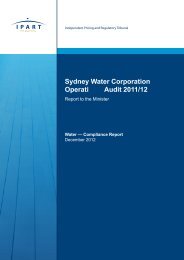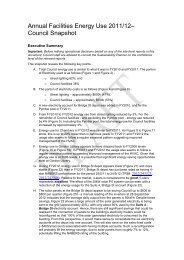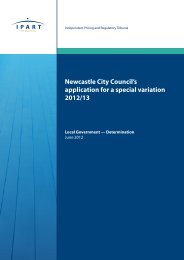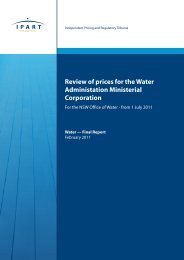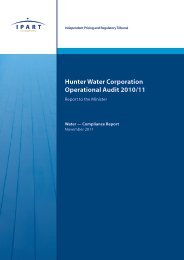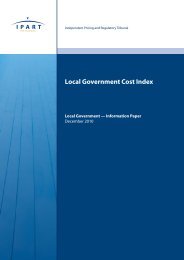Review of the Registered Clubs Industry in NSW - Clubs NSW
Review of the Registered Clubs Industry in NSW - Clubs NSW
Review of the Registered Clubs Industry in NSW - Clubs NSW
You also want an ePaper? Increase the reach of your titles
YUMPU automatically turns print PDFs into web optimized ePapers that Google loves.
2 The registered clubs <strong>in</strong>dustry <strong>in</strong> <strong>NSW</strong><br />
These elements reflect, <strong>in</strong> part, <strong>the</strong> historical development <strong>of</strong> <strong>the</strong> clubs <strong>in</strong>dustry, as<br />
discussed <strong>in</strong> section 2.1.<br />
IPART notes that <strong>the</strong> extent to which clubs pursue <strong>the</strong>se functions has contributed to<br />
a wide range <strong>of</strong> clubs operat<strong>in</strong>g with<strong>in</strong> <strong>the</strong> <strong>in</strong>dustry. At one end <strong>of</strong> <strong>the</strong> spectrum are<br />
small, volunteer-run clubs, with little or no revenue from gam<strong>in</strong>g mach<strong>in</strong>es. These<br />
clubs are <strong>of</strong>ten centred on specifically pursu<strong>in</strong>g a particular social purpose, such as<br />
provid<strong>in</strong>g sport<strong>in</strong>g facilities or a meet<strong>in</strong>g place for members shar<strong>in</strong>g a common<br />
cultural l<strong>in</strong>k. At <strong>the</strong> o<strong>the</strong>r end are large, more commercially-run enterprises, with a<br />
large number <strong>of</strong> gam<strong>in</strong>g mach<strong>in</strong>es, many members and a significant number <strong>of</strong><br />
visitors, as well as diversified bus<strong>in</strong>ess segments. While <strong>the</strong>se clubs still exist to<br />
pursue social outcomes, differentiation from for-pr<strong>of</strong>it commercial bus<strong>in</strong>esses is<br />
more difficult.<br />
IPART notes <strong>the</strong> argument made by <strong>Clubs</strong><strong>NSW</strong> that register<strong>in</strong>g a club provides a<br />
means <strong>of</strong> entrench<strong>in</strong>g <strong>the</strong> essential rules that underp<strong>in</strong> <strong>the</strong> democratic, not-for-pr<strong>of</strong>it<br />
operation <strong>of</strong> clubs and also <strong>the</strong> strict probity requirement that ensures member<br />
<strong>in</strong>terests are protected. 21 These rules are captured through <strong>the</strong> requirements <strong>in</strong><br />
section 10 <strong>of</strong> <strong>the</strong> <strong>Registered</strong> <strong>Clubs</strong> Act and must be met before <strong>the</strong> certificate <strong>of</strong><br />
registration is issued and also on an ongo<strong>in</strong>g basis to ensure that <strong>the</strong> club is not deregistered<br />
or ano<strong>the</strong>r penalty imposed. The follow<strong>in</strong>g elements serve <strong>the</strong>se purposes:<br />
<br />
<br />
<br />
<br />
<br />
<br />
<br />
The club must be conducted <strong>in</strong> good faith as a club. It must demonstrate,<br />
typically through its articles <strong>of</strong> association/club constitution, that it is a body or<br />
association <strong>of</strong> persons that pursue a common purpose (social, literary, political,<br />
sport<strong>in</strong>g or athletic purposes or for any o<strong>the</strong>r lawful purposes).<br />
<strong>Clubs</strong> must be <strong>in</strong>corporated under <strong>the</strong> Corporations Act.<br />
No member <strong>of</strong> <strong>the</strong> club is permitted to receive any pr<strong>of</strong>it, benefit or advantage<br />
from <strong>the</strong> club that is not <strong>of</strong>fered fully to every o<strong>the</strong>r member <strong>of</strong> <strong>the</strong> club.<br />
While <strong>the</strong> club is allowed to provide liquor to its members, this must be done <strong>in</strong> a<br />
safe, controlled environment. Additionally, no employee or director <strong>of</strong> <strong>the</strong> club is<br />
allowed to receive payment based on <strong>the</strong> amount <strong>of</strong> liquor sold or by any<br />
reference to <strong>the</strong> operation <strong>of</strong> gam<strong>in</strong>g mach<strong>in</strong>es by <strong>the</strong> club.<br />
The club must keep correct accounts and books <strong>in</strong> respect <strong>of</strong> <strong>the</strong> f<strong>in</strong>ancial affairs <strong>of</strong><br />
<strong>the</strong> club. These must be available to members such that <strong>the</strong>y can monitor <strong>the</strong><br />
performance <strong>of</strong> <strong>the</strong> club <strong>in</strong> a similar way to that <strong>of</strong> shareholders <strong>in</strong> a publicly<br />
listed company.<br />
Senior employees and directors <strong>of</strong> clubs must comply with a strict set <strong>of</strong><br />
accountability requirements. These requirements ensure that <strong>the</strong> club is operated<br />
with <strong>the</strong> best <strong>in</strong>terests <strong>of</strong> <strong>the</strong> club members <strong>in</strong> m<strong>in</strong>d.<br />
The club must have premises <strong>of</strong> which it is <strong>the</strong> bona fide occupier for <strong>the</strong> purposes<br />
<strong>of</strong> <strong>the</strong> club and which are provided and ma<strong>in</strong>ta<strong>in</strong>ed from <strong>the</strong> funds <strong>of</strong> <strong>the</strong> club.<br />
21 <strong>Clubs</strong><strong>NSW</strong> submission, 31 July 2007, p 21.<br />
36 IPART <strong>Review</strong> <strong>of</strong> <strong>the</strong> <strong>Registered</strong> <strong>Clubs</strong> <strong>Industry</strong> <strong>in</strong> <strong>NSW</strong>


